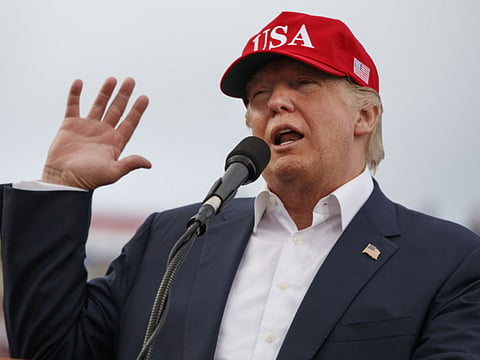A foreign policy team of rivals that’s set to fail
Conflict is inevitable between Trump’s motley bunch of lawmakers, businessmen and generals, given their lack of strategic focus and executive experience

With the announcement that he will nominate ExxonMobil chief executive Rex Tillerson as his secretary of state, President-elect Donald Trump has rounded out a foreign policy team that is, to put it mildly, profoundly different from that of any of his six Republican predecessors since the Second World War. It’s also unlikely to last particularly long.
Certainly Trump’s team is different from that of the George W. Bush administration, which came loaded with Republican foreign policy establishment figures — a difference Trump will no doubt flaunt as a virtue. Indeed, the Bush team proves that appointing officials with long experience in Washington does not by itself guarantee a successful foreign policy, particularly not if there are intense disagreements within the group.
But the Trump team differs not only from that of George W. Bush, but also from the teams of Presidents George H.W. Bush, Ronald Reagan or, for that matter, Gerald Ford, Richard M. Nixon or Dwight D. Eisenhower. Those teams included people with experience at the top or second levels of the Cabinet and national-security apparatus in previous administrations. The Trump team has none.
At meetings of the National Security Council, Trump, who himself has no foreign policy experience, will have alongside him a vice-president and a CIA director from Congress; a secretary of state from the business community; and a defence secretary and national security adviser from the military. It will be argued that those from the military do have foreign policy experience, but that experience is necessarily geared more toward operations than more conceptual and abstract questions of foreign policy.
Prior Republican administrations came to office with a strategic focus. For years, the dominant issue was the Cold War. After it ended, the debate shifted to if, when or how the United States should use military force around the world — a debate that culminated with George W. Bush’s disastrous invasion of Iraq.
To the extent that the new team can be said to have a focus, it seems to have its gaze primarily on defeating Daesh (the self-proclaimed Islamic State of Iraq and the Levant) and, perhaps, coming up with a new approach to Iran. Given some of Trump’s conciliatory statements about Russia, as well as ties between the Kremlin and Trump and Tillerson, it seems likely that the White House will seek improved relations with the country, though they have given no clue as to what shape and strategic goals that relationship will take on. Beyond that, the members of the Trump team collectively have no executive-branch or diplomatic experience in dealing with other regions of the world or with many of its leading powers, like China, India, Japan, Germany, France or Britain. Trump’s and Tillerson’s business experiences will prove of limited value in the new task of conducting affairs of state.
Strong disagreements baked into team
It’s not just their lack of experience that will make for an unstable foreign policy ship. Trump has, perhaps by design, chosen people who do not know one another, and appear to disagree in personality and worldview.Given his past interests and temperament, it seems likely that Michael Flynn, the retired lieutenant-general whom Trump has picked as his national security adviser, will want an action-oriented National Security Council. But the last time the council was geared toward operations, during the Reagan administration, the result was the Iran-Contra scandal, which nearly brought down the administration.
One question is who will run the coordinating functions of the National Security Council in the fashion that, say, Brent Scowcroft carried out for Ford and the elder Bush? That job may fall to K.T. McFarland, chosen as the deputy national security adviser, who was once a relatively low-ranking aide to Henry Kissinger (and who is now said to be arranging Kissinger’s visits to Trump Tower). Strong disagreement seems baked into the team. James Mattis, the retired Marine general whom Trump has chosen as secretary of defence, has voiced support for the Obama administration’s nuclear agreement with Iran, while Flynn, Mike Pompeo at the CIA and Trump himself have attacked it. Pompeo has been a hawk on Russia, in contrast to several of his colleagues.
Reagan was the last Republican president who arrived in Washington challenging the foreign policy establishment of his own party. In its early years, his foreign policy team was notoriously unstable.He replaced his secretary of state after less than 18 months. By the end of his third year, he was working with his third national security adviser. The Reagan Cabinet members who stayed on the job the longest, Secretary of State George P. Shultz and Defence Secretary Caspar Weinberger, frequently engaged in nasty bickering. Still, Reagan left office with a historic success, the diplomacy with the Soviet leader, Mikhail Gorbachev, that helped end the Cold War. But Reagan was a leader who set foreign policy goals and used his advisers’ creative tension to move the country toward them. By most accounts, Trump has operated with a different style; he seems to prefer letting his inner circle fight it out, after which he picks and advocates for the winner.
This may work well in the business world, where the metrics of success are more or less straightforward. In foreign policy, though, the goalposts don’t just move — when an administration begins, they don’t even exist. It’s up to the president to decide where and how his team should advance. If Trump doesn’t, then his team of rivals and outsiders will quickly devolve into a battle royal.
— New York Times News Service
James Mann is a resident fellow at Johns Hopkins School of Advanced International Studies and the author of Rise of the Vulcans: The History of Bush’s War Cabinet and The Rebellion of Ronald Reagan.


